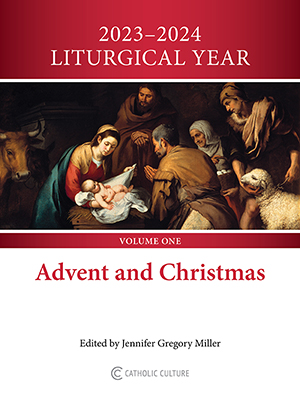Catholic Activity: Customs of St. Stephen's Day
Father Francis Weiser describes traditional customs related to the feast of Saint Stephen during Christmas week.
DIRECTIONS
Stephen (December 26) — The story of this saint can be found in the Acts of the Apostles (chaps. 6 and 7). He is usually pictured in deacon''s vestments, with a palm branch, the symbol of martyrdom, in his hand, and sometimes with a stone in his left hand, to indicate his death by stoning. Many images show him wearing a wreath, which is an allusion to his name, for the Greek word Stephanos means "wreath."
From early times this Saint was venerated as patron of horses. A poem of the tenth century pictures him as the owner of a horse and dramatically relates how Christ Himself miraculously cured the animal for His beloved Disciple. Though there is no historical basis for this association with horses in the life of Saint Stephen, various explanations have been attempted. Some are founded on ancient Germanic ritual celebrations of horse sacrifices at Yuletide. Others use the fact that in medieval times "Twelfth-night" (Christmas to Epiphany) was a time of rest for domestic animals, and horses, as the most useful servants of man, were accorded at the beginning of this fortnight something like a feast day of their own.
It was a general practice among the farmers in Europe to decorate their horses on Stephen's Day, and bring them to the house of God to be blessed by the priest and afterward ridden three times around the church, a custom still observed in many rural sections. Later in the day the whole family takes a gay ride in a wagon or sleigh (St. Stephen's ride). In Sweden, the holy deacon was changed by early legend into the figure of a native saint, a stable boy who is said to have been killed by the pagans in Helsingland. His name — Staffan — reveals the original saint. The "Staffan Riders" parade through the towns of Sweden on December 26, singing their ancient carols in honor of the "Saint of Horses."
Horses' food, mostly hay and oats, is blessed on Stephen's Day. Inspired by pre-Christmas fertility rites people throw kernels of these blessed oats at one another and at their domestic animals as well. In sections of Poland they even toss the oats at the priest after Mass. Popular legends say this custom is an imitation of stoning, performed in honor of the Saint's martyrdom. The ancient fertility rite, however, can still be clearly recognized in the Polish custom of boys and girls throwing walnuts at each other on Saint Stephen''s Day.
In past centuries water and salt were blessed on this day and kept by farmers to be fed to their horses in case of sickness. Women also baked special breads in the form of horseshoes (St. Stephen's horns: podkovy) which were eaten on December 26.
In some parts of the British Isles, Saint Stephen''s Day is the occasion for boys (the Wren Boys they are called) to go from house to house, one of them carrying a dead wren on a branch decorated with all kinds of gay, streaming ribbons. Stopping in front of each door they sing a song the words of which run something like this:
God bless the mistress of this house,
A golden chain around her neck.
And if she''s sick or if she''s sore,
The Lord have mercy on her soul.
After saluting the master, they then sing:
The wren, the wren, the king of all birds,
On Saint Stephen's Day was caught in the furze.
Up with the kettle and down with the pot,
And give us our answer and let us be gone.
The master of the house then takes a careful look at the bird to make sure it is a wren and not, perchance, a sparrow; and alms are given to the wandering singers.
LITURGICAL PRAYER: We beseech Thee, O Lord, grant us to imitate what we revere, that we may learn to love also our enemies; for we celebrate his birthday, who knew to plead even for his persecutors with Thy Son, our Lord Jesus Christ.
Activity Source: Holyday Book, The by Francis X. Weiser, S.J., Harcourt, Brace and Company, Inc., New York, 1956







